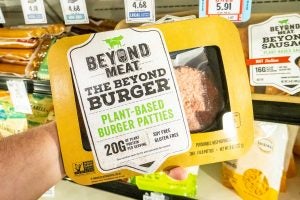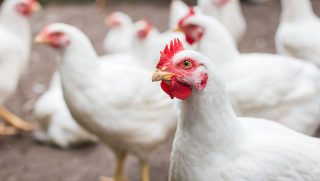The high court in France is allowing manufacturers of plant-based alternatives to describe their foods in terms that are typically associated with meat, such as “burger,” “steak,” or “filet.”
The court’s decision in France this week squashed a ban on “meaty” names that had been issued in February, which would have prohibited “escalope,” “prime rib,” and more than a dozen other terms from being used on plant-based products. The February ruling was a response to a long-standing complaint by meat producers that terms like “vegetarian ham” or “vegan sausage” were confusing for consumers.
“Consumers are simply not confused by the labelling of plant-based food and efforts to restrict the plant-based industry represent a huge waste of time and resources,” said Jasmijn de Boo, Global CEO of ProVeg International. ProVeg has a stated mission of reducing the consumption of animal products by 50 percent by 2040.
Other EU member states that have considered similar restrictions on food labeling, but the French court decision could open the door to further legal challenges. In the U.S., the labeling issue is just as heated, particularly in the dairy industry, where plant-based alternatives sit side-by-side on grocery shelves with real dairy products, and plant-based marketing has aggressively attempted to blur the lines in how they portray themselves to customers.
Perhaps most notable in the U.S., however, is that the dairy industry’s criticisms are based on official Food and Drug Administration restrictions that aren’t enforced against plant products.
Regardless, the movement to support the plant-based industry gained further steam this week when the Johannesburg High Court in South Africa overturned a planned seizure of all plant-based products that use “meat-like” terms. That ruling was described by the Consumer Goods Council of South Africa as a “collective victory for the meat analogue sector, which is a growing source for alternative plant based food products, as well as a source of employment throughout the value chain.”
Concern about plant-based alternatives has also emerged from the consumer side, where major companies such as Beyond Burger have been sued over allegations that its products inflated the amount of protein they contained.

Plant-based burgers often promise protein comparable to their animal-based counterparts, but the way protein is expressed on current nutrition labels — a single generic value expressed in grams — can be misleading, according to independent research. That’s because the human body does not use “protein” per se. Instead, it needs essential amino acids, which are present in proteins, but the concentration and digestibility of amino acids are different among protein sources.
“It’s particularly children, teenagers, lactating women, and older people who are at risk of not getting enough amino acids,” said Hans H. Stein, professor in the Department of Animal Sciences and the Division of Nutritional Sciences at the University of Illinois and co-author of a relevant European Journal of Nutrition study. “Results of this experiment, along with previous data, demonstrate the importance of getting animal-based proteins into diets to provide sufficient quantities of digestible essential amino acids to these populations.
“This is also really important in developing countries where there may be little access to animal-based proteins, particularly for children. In some countries, a majority of children are amino acid deprived. That’s extremely serious because, if children don’t get enough amino acids, their brain development can suffer. It’s especially important in those cases to design a strategy for getting high-quality proteins into diets for children.”


